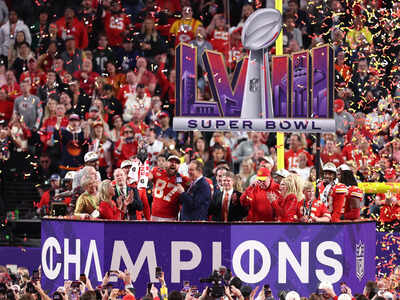The Super Bowl is the pinnacle of American football, bringing together the best teams from the AFC and NFC to battle for the coveted Lombardi Trophy. Since its inception in 1967, the championship game has evolved into a global spectacle, featuring some of the most memorable moments in sports history. As Super Bowl LIX approaches, here’s a complete look at the past winners and key historical milestones.
Evolution of the Super Bowl
The first Super Bowl was played on January 15, 1967, between the Green Bay Packers and the Kansas City Chiefs. The Packers, led by legendary coach Vince Lombardi, won the game 35-10, setting the stage for what would become the most-watched sporting event in the United States. Over the years, dynasties have emerged, including the New England Patriots, Pittsburgh Steelers, and Dallas Cowboys, all of whom have left an indelible mark on Super Bowl history.
Teams with the Most Super Bowl Wins
Certain franchises have dominated the Super Bowl era, with the New England Patriots and Pittsburgh Steelers leading the pack with six titles each. The San Francisco 49ers and Dallas Cowboys follow closely with five championships, while the Green Bay Packers and New York Giants each boast four. Meanwhile, the Kansas City Chiefs, fresh off back-to-back wins in 2023 and 2024, are now among the elite teams in Super Bowl history.
Super Bowl Winners by Year
Super Bowl
| Year
| Winner
| Runner-Up
| Score
|
I
| 1967
| Green Bay Packers
| Kansas City Chiefs
| 35–10
|
II
| 1968
| Green Bay Packers
| Oakland Raiders
| 33–14
|
III
| 1969
| New York Jets
| Baltimore Colts
| 16–7
|
IV
| 1970
| Kansas City Chiefs
| Minnesota Vikings
| 23–7
|
V
| 1971
| Baltimore Colts
| Dallas Cowboys
| 16–13
|
VI
| 1972
| Dallas Cowboys
| Miami Dolphins
| 24–3
|
VII
| 1973
| Miami Dolphins
| Washington Redskins
| 14–7
|
VIII
| 1974
| Miami Dolphins
| Minnesota Vikings
| 24–7
|
IX
| 1975
| Pittsburgh Steelers
| Minnesota Vikings
| 16–6
|
X
| 1976
| Pittsburgh Steelers
| Dallas Cowboys
| 21–17
|
XI
| 1977
| Oakland Raiders
| Minnesota Vikings
| 32–14
|
XII
| 1978
| Dallas Cowboys
| Denver Broncos
| 27–10
|
XIII
| 1979
| Pittsburgh Steelers
| Dallas Cowboys
| 35–31
|
XIV
| 1980
| Pittsburgh Steelers
| Los Angeles Rams
| 31–19
|
XV
| 1981
| Oakland Raiders
| Philadelphia Eagles
| 27–10
|
XVI
| 1982
| San Francisco 49ers
| Cincinnati Bengals
| 26–21
|
XVII
| 1983
| Washington Redskins
| Miami Dolphins
| 27–17
|
XVIII
| 1984
| Los Angeles Raiders
| Washington Redskins
| 38–9
|
XIX
| 1985
| San Francisco 49ers
| Miami Dolphins
| 38–16
|
XX
| 1986
| Chicago Bears
| New England Patriots
| 46–10
|
XXI
| 1987
| New York Giants
| Denver Broncos
| 39–20
|
XXII
| 1988
| Washington Redskins
| Denver Broncos
| 42–10
|
XXIII
| 1989
| San Francisco 49ers
| Cincinnati Bengals
| 20–16
|
XXIV
| 1990
| San Francisco 49ers
| Denver Broncos
| 55–10
|
XXV
| 1991
| New York Giants
| Buffalo Bills
| 20–19
|
XXVI
| 1992
| Washington Redskins
| Buffalo Bills
| 37–24
|
XXVII
| 1993
| Dallas Cowboys
| Buffalo Bills
| 52–17
|
XXVIII
| 1994
| Dallas Cowboys
| Buffalo Bills
| 30–13
|
XXIX
| 1995
| San Francisco 49ers
| San Diego Chargers
| 49–26
|
XXX
| 1996
| Dallas Cowboys
| Pittsburgh Steelers
| 27–17
|
XXXI
| 1997
| Green Bay Packers
| New England Patriots
| 35–21
|
XXXII
| 1998
| Denver Broncos
| Green Bay Packers
| 31–24
|
XXXIII
| 1999
| Denver Broncos
| Atlanta Falcons
| 34–19
|
XXXIV
| 2000
| St. Louis Rams
| Tennessee Titans
| 23–16
|
XXXV
| 2001
| Baltimore Ravens
| New York Giants
| 34–7
|
XXXVI
| 2002
| New England Patriots
| St. Louis Rams
| 20–17
|
XXXVII
| 2003
| Tampa Bay Buccaneers
| Oakland Raiders
| 48–21
|
XXXVIII
| 2004
| New England Patriots
| Carolina Panthers
| 32–29
|
XXXIX
| 2005
| New England Patriots
| Philadelphia Eagles
| 24–21
|
XL
| 2006
| Pittsburgh Steelers
| Seattle Seahawks
| 21–10
|
XLI
| 2007
| Indianapolis Colts
| Chicago Bears
| 29–17
|
XLII
| 2008
| New York Giants
| New England Patriots
| 17–14
|
XLIII
| 2009
| Pittsburgh Steelers
| Arizona Cardinals
| 27–23
|
XLIV
| 2010
| New Orleans Saints
| Indianapolis Colts
| 31–17
|
XLV
| 2011
| Green Bay Packers
| Pittsburgh Steelers
| 31–25
|
XLVI
| 2012
| New York Giants
| New England Patriots
| 21–17
|
XLVII
| 2013
| Baltimore Ravens
| San Francisco 49ers
| 34–31
|
XLVIII
| 2014
| Seattle Seahawks
| Denver Broncos
| 43–8
|
XLIX
| 2015
| New England Patriots
| Seattle Seahawks
| 28–24
|
50
| 2016
| Denver Broncos
| Carolina Panthers
| 24–10
|
LI
| 2017
| New England Patriots
| Atlanta Falcons
| 34–28 (OT)
|
LII
| 2018
| Philadelphia Eagles
| New England Patriots
| 41–33
|
LIII
| 2019
| New England Patriots
| Los Angeles Rams
| 13–3
|
LIV
| 2020
| Kansas City Chiefs
| San Francisco 49ers
| 31–20
|
LV
| 2021
| Tampa Bay Buccaneers
| Kansas City Chiefs
| 31–9
|
LVI
| 2022
| Los Angeles Rams
| Cincinnati Bengals
| 23–20
|
LVII
| 2023
| Kansas City Chiefs
| Philadelphia Eagles
| 38–35
|
LVIII
| 2024
| Kansas City Chiefs
| San Francisco 49ers
| 25–22 (OT)
|
As Super Bowl LIX approaches, the Chiefs aim for an unprecedented three-peat while the Eagles seek redemption. No matter the outcome, history will once again be made on the grandest stage in football.










